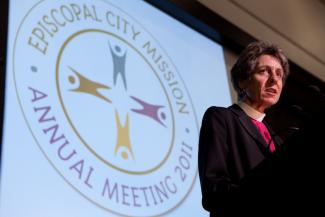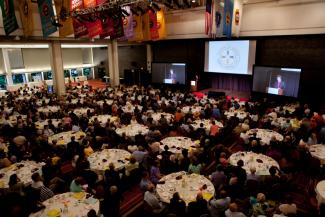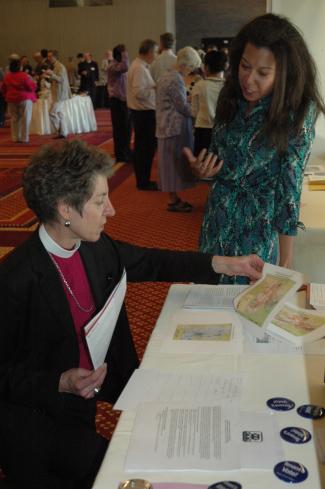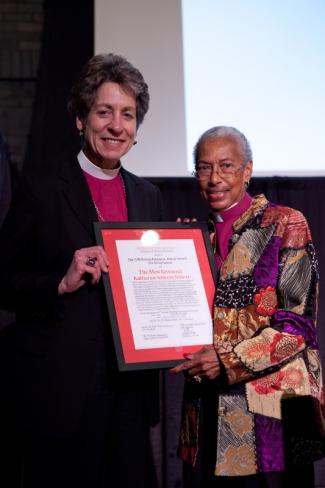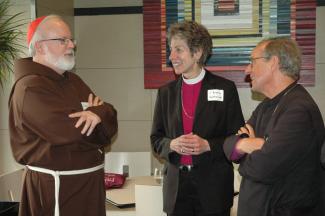Presiding Bishop Katharine Jefferts Schori joined 560 Episcopalians in the Diocese of Massachusetts on June 7 to celebrate the work of Episcopal City Mission, encouraging them in her keynote address to both pray and “work like hell” for a world where no one goes hungry, illness is answered with healing and all are free to live in peace.
“We live in hope for a world redeemed into that reality and we work at transformation because we are a very long way indeed from seeing it come to fruition,” she said.
Episcopal City Mission (ECM) promotes social and economic justice, with particular emphasis on the urban poor. Its annual dinner event at Boston University showcases the programs and organizations funded through its grant programs and its public policy initiatives, including, this year, an affordable housing project in partnership with the Church of the Holy Spirit in Mattapan, and a letter-writing campaign against the U.S. Bureau of Immigration and Customs Enforcement’s controversial Secure Communities program aimed at deporting criminals who are in this country illegally. Massachusetts Governor Deval Patrick had just a few days earlier announced he would not endorse it.
“We know that we were not the only ones organizing opposition to that program, but we are delighted that so many Episcopalians and so many parishes participated in that campaign,” Dr. Ruy Costa, ECM’s executive director, told the crowd. He said that 800 letters from more than 60 parishes helped successfully voice opponents’ concern that flaws in the program would result in overreach and the deportation of persons who are not criminals.
Costa also announced a partnership with St. Mary’s Church in Dorchester to expand the reach of its food pantry program and called for volunteers with expertise in food distribution.
Jefferts Schori said these kinds of efforts reflect “the most basic ways that the Christian community has served and empowered God’s people,” describing how Jesus spent much of his public ministry feeding, healing and teaching the crowds that followed him, and how he challenged both political and religious authorities about the injustices that made the rich richer and the poor poorer.
“The last presidential election was not the first time somebody figured out that Jesus was a community organizer,” she said.
She devoted much of her 30-minute address to examples from across the Episcopal Church where community organizing is having an impact through creative responses to local hunger, health care, housing and education needs: the Church of St. Paul the Apostle in Savannah, Ga., redeveloping a city block as affordable housing; the St. James’s Family Center in Cathlamet, Wash., taking over management of the county’s domestic violence shelter as a result of its work with parents and children; the Diocese of Arizona offering health care through small community clinics across the border in Mexico; numerous other congregations getting involved in food production and distribution, including one in Smyrna, Tenn., that was revitalized by the arrival of Burmese refugee farmers who transformed church acreage into truck gardens whose vegetables are subscribed before they are even planted.
“A church can have a major impact on a city by dreaming big and finding appropriate partners,” she said.
She also cited the Epiphany School in Dorchester and Esperanza Academy in Lawrence in the Diocese of Massachusetts as “revolutionary” tuition-free middle schools serving city youth from economically disadvantaged families, as well as Ecclesia Ministries’ common cathedral ministry of worship with the homeless on Boston Common.
“I wonder what would happen if their worship site moved to the steps of the State House? Advocacy for the homeless might become more impassioned,” she said.
She voiced particular concern about the vulnerability of the world’s poor to the effects of climate change, describing “blind consumption and thoughtless waste” as “communicable diseases that we human beings are spreading across the globe.”
Resistance to change and lack of hope are the biggest obstacles to transformation, she said.
“We need bold and prophetic voices. We need networks that inspire and organize people,” she said. “There is abundant work to be done and it must always be inspired by that vision of shalom: food and drink for feasting, dignified work and sabbath leisure, none lording it over another, all God’s children living in peace. Pray that it may be so and work like hell to make it so.”
Bishop Barbara C. Harris, retired bishop suffragan of Massachusetts, presented Jefferts Schori with ECM’s Barbara C. Harris Award for Social Justice. Also honored were Allan Rodgers of the Parish of the Epiphany in Winchester for his advocacy on behalf of low-income families, and Bill Haynsworth of All Saints Parish in Brookline for his work to promote affordable housing and his service as ECM board chairman.
Earlier in the afternoon, Cardinal Sean O’Malley of the Roman Catholic Archdiocese of Boston joined other Massachusetts leaders of Christian denominations at a reception for Jefferts Schori hosted by the Diocese of Massachusetts’ three bishops.
--Tracy J. Sukraw

